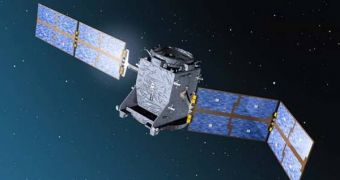European officials, decision makers and space authorities are all quite undecided about the faith of the Galileo satellite project, which was supposed to bring 28 observation and communication satellites in orbit as fast as possible. The system, which is part of the global navigation satellite system (GNSS) class, is scheduled to become operational in 2013, and will provide timing and navigation data free of charge to most of the European population. At this point, the only fully functional GNSS is America's GPS, but Russia and China have announced their intentions of completing their own.
The European Commission wanted to have competition for the new system from day one, which it said it would pull the European space industry out of its established patterns. But the issue is not that simple, as evidenced by the fact that politicians want one thing, economists another, and the European Space Agency (ESA) something completely different. The agency's Director of Navigation, Rene Oosterlinck, said that it would be nothing more than good economics to launch all 28 satellites whose contracts would be awarded this year from the Kourou Space Center, in French Guyana, South America, aboard Russian-built Soyuz delivery systems.
However, others show that Arianespace's Ariane 5 heavy-lifting rockets are more than capable of handling the delivery of up to four Galileo satellites at the same time. Right now, such a rocket can only take three satellites to orbit, but with $50 million worth of modifications, it could easily accommodate four. Oosterlinck explained he favored a plan where the Ariane 5 would be kept in reserve, in case the Soyuz became unavailable. But critics argue that using Russian rockets would only go to show that Europe is not as autonomous as it would like to think, and would fail to prove the idea that started the project.
Representatives from Astrium and OHB, the two main players that bid for the 840-million-Euro contract, pointed out that ESA should decide on one of them as the main builder, and give them the contracts to build all of the satellites. The EU was contemplating the idea of sharing the number of satellites between the two producers, but that would be economically unfeasible. If only one produces all of the Galileo components, then that firm can cut back on prices on account of large-scale production. Otherwise, prices could go up between 15 and 35 percent.

 14 DAY TRIAL //
14 DAY TRIAL //